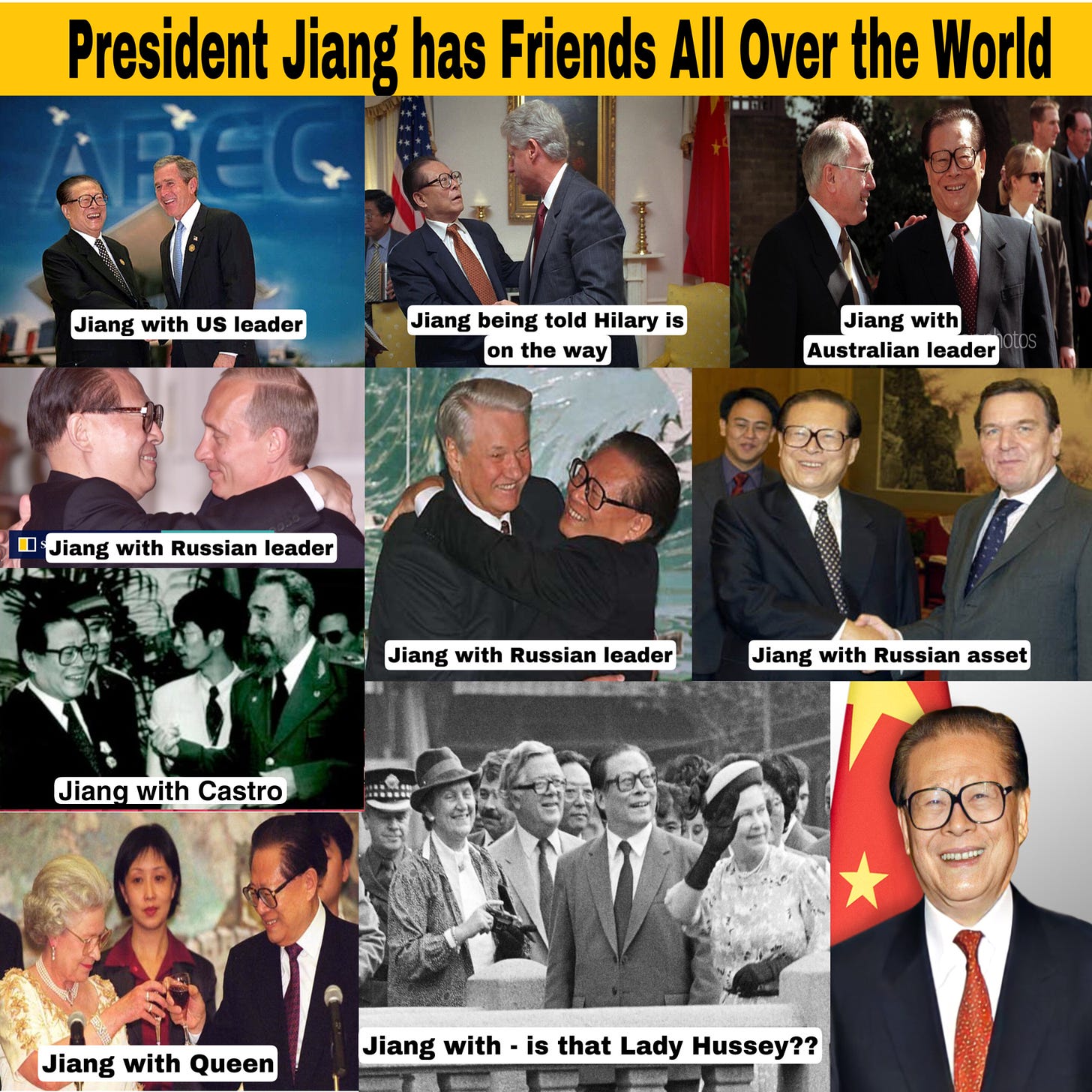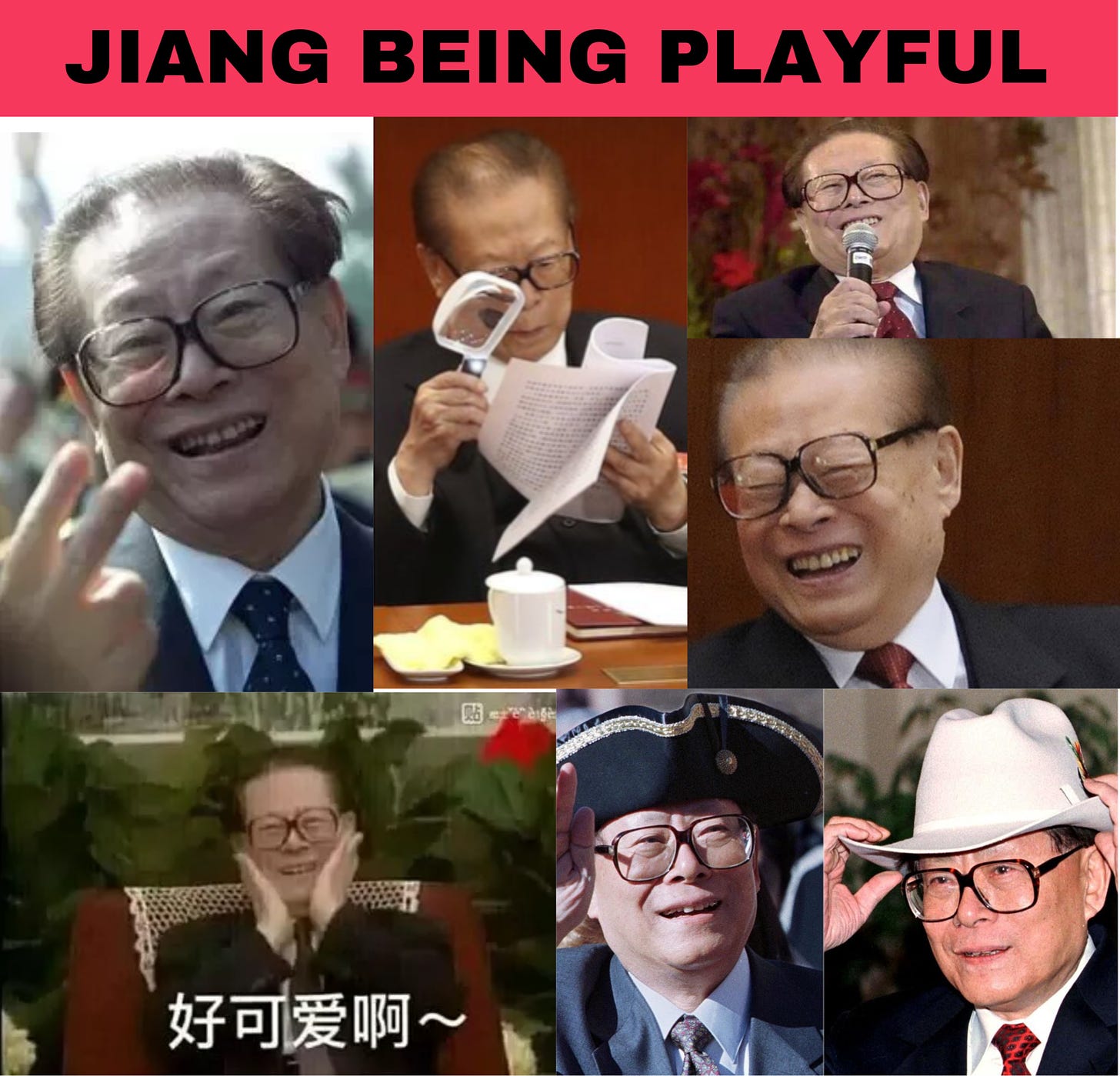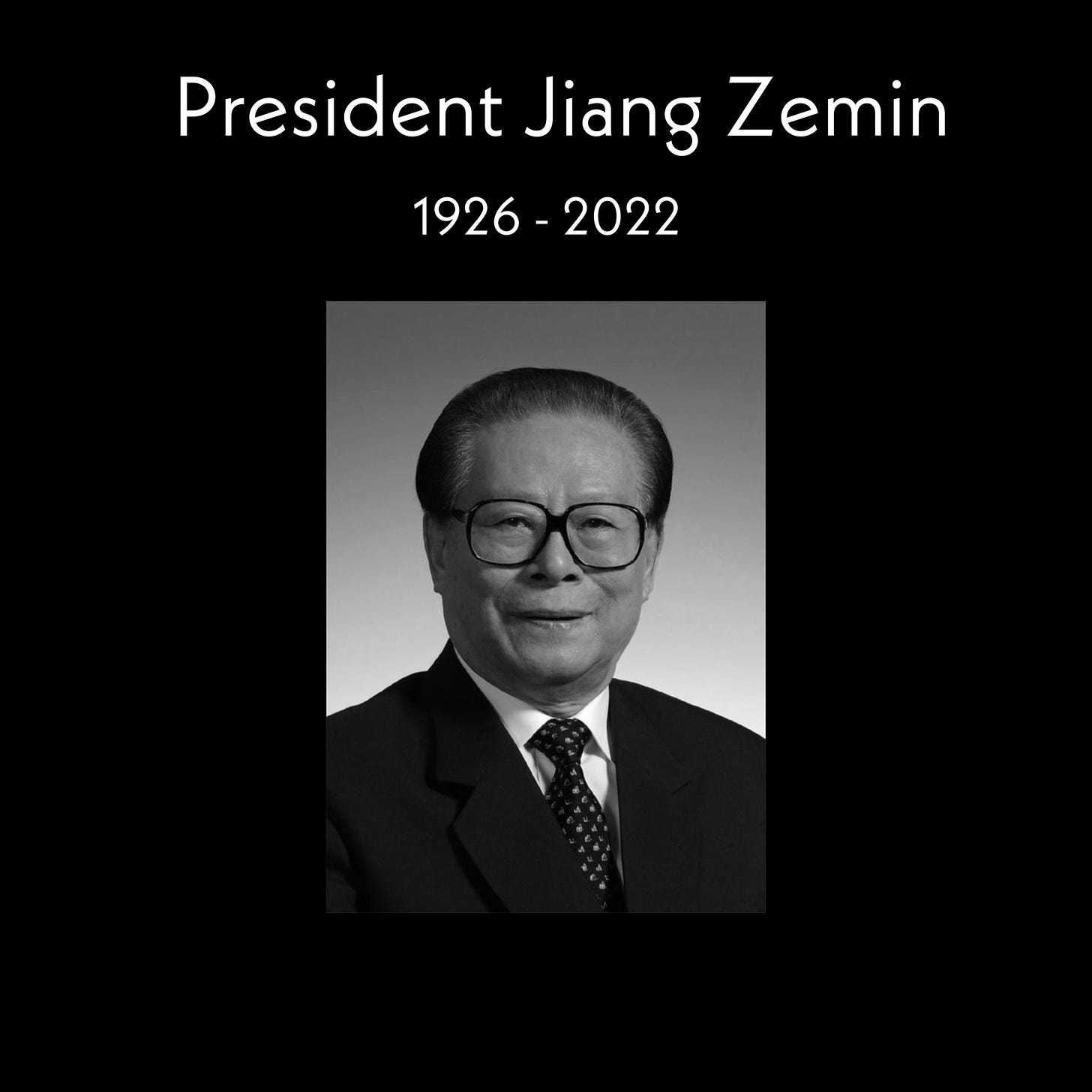Issue 17: Jiang Zemin – My favourite PRC politician
A Man Who Did Not Get The Recognition He Deserves
Please note all content is personal opinion only. This does not reflect the opinion of my employer – but it should.
2022 seems to be a dangerous year to turn 96 – first the Queen, then Angela Lansbury and now Jiang Zemin.
I have always been a big fan of Jiang Zemin.
Jiang was already president of China (and more importantly CCP party secretary) when I arrived in Shanghai (the city where he had just been mayor) in 1993.
The Western newspaper reports about Jiang Zemin when he passed seem to underplay both his achievements and his playfulness – playfulness being a word seldom associated with senior politicians in an authoritarian state.
The Western media has portrayed Jiang as an unwilling reformer (goaded by Deng Xiaoping to move more quickly and then with Zhu Rongji doing much of the heavy lifting) and authoritarian in cracking down on the religious group Falun Gong and that when he was Shanghai mayor he brutally suppressed protestors in 1989.
On the first point GDP per head in 1993 was USD 377 went up by almost 350% to USD 1290 by 2003. Accordingly, during Jiang’s tenure China went from being a very, very poor country to a poorer country poised to become a middle-income economy (i.e. USD 12,500 in 2022).
Jiang was extremely keen on attracting foreign investment. An early client of mine was the Rotterdam city representative office. They had opened several years before and we were just looking at some of their older records (not much to do in Shanghai in the early 1990s) we found a cache of their opening ceremony – and there he was Jiang Zemin with his beautiful, big glasses. It is unthinkable today but back in the late 1980s the Shanghai mayor was so keen on foreign investment that he would turn up to a rep office opening.
This reminds me (of a non-Jiang story). The Dutch are very talented at attracting Chinese politicians by dubious means. I was at another Dutch rep office opening in the mid-1990s. At the start of the event there was a full row at the front set aside for the Shanghai politicians. Just before proceedings commenced the Shanghai heavy hitters arrived to take their place and the agenda for the speeches was distributed. I was surprised to see that the keynote speaker was none other than Prince Charles. However, my surprise was nothing compared to the surprise of the Chinese politicians when a projector screen was set up and a black and white video of Prince Charles in a kilt talking about sustainability started. Shortly after the presentation the politicians discarded their normal stoicism and left in a huff. Still one of the funniest things I have ever seen. Those mischievous Dutch!
As to Jiang’s authoritarian streak this does not accord with my recollection – at least when discussing in Shanghai this back in the early 1990s the understanding was that Jiang Zemin was noticed by the upper ranks because he was able to keep the students calm without resorting to violence. As the students became restive Jiang went to Jiaotong University (his alma mater) and recited the entire Gettysburg Address to the students in English. I assume he then threatened the students that if they did not disperse, he would recite again. They dispersed.
I also remember that from 1993 to 2013 the taxi drivers were much more forthcoming in providing their opinions. This may also be due in no doubt to improved comprehension on my part but in the late 1990s one did not feel that the taxi drivers were feeling particularly constrained.
As to Falun Gong I am pretty sure that a similar organization in the West would be referred to as a cult rather than a religion.
Jiang’s Achievements
But the one thing I wanted to share was to highlight some of the things that many articles failed to stress (or omitted completely):
Jiang stood up to the army and got them out of business. Back in 1993 it was routine to see army license plated cars to just start driving on the wrong side of the road. The Army was in all kinds of businesses – hotels, factories, karaoke bars. Jiang and Zhu Rongji forced the PLA out of business and back to the military – this was enormously important but no doubt incredibly difficult and risky. Many generals fled when this was carried out. No report on Jiang seems to mention this.
Jiang was great for Shanghai. Shanghai was my home longer than anywhere else. During Jiang term the city was transformed. Many of his leadership were Shanghainese (often referred to as the “Shanghai Gang”). Jiang unleashed Shanghai’s potential and with Pudong he gave the Yangtze Delta region a means by which to compete with the south.
Jiang Dealt Deftly with the Rest of the World - Jiang also was instrumental in China joining the WTO – this was no mean feat as at the time part of the calculus of Jiang and Zhu Rongji appeared to be to leverage use of WTO as a means to force restructuring of the Chinese economy. This may have been more important than China gaining access to foreign markets. No articles about Jiang’s death mention the WTO entry by China as a great achievement.
However, Jiang’s tenure was not just about the economy – at a time where China was more pitied for its relative poverty than feared for its strength – Jiang was able to deal with a US fighter plane crash landing on Hainan (George W Bush had to say "very sorry" about the loss of a Chinese pilot and the Americans had to pay for the food served to the service personnel that were held and the Chinese shipped back the jet in boxes). Had to keep things together when the Chinese embassy in Belgrade was bombed. And, perhaps, the greatest coup of all – in 2001 China was given the honour to host the Summer Olympics in 2008 – a point that in future history books will likely be seen as a moment where China became a superpower.
Jiang was fun loving and open – whether it was singing Love Me Tender in English or trying to get the Queen to join him in karaoke or admonishing Hong Kong journalists for being naïve – he was always up for a laugh. In addition to mandarin and several dialects Jiang also spoke English and Russian.
In closing, Jiang Zemin was a remarkable leader. He was particularly supportive of Shanghai and was very keen to support China to attract foreign investment – which early on was relatively controversial.
He oversaw an incredible reduction in poverty. Some commentators claim that this led to greater income disparity – but this was not done by dragging people down but rather a lot of people got richer than others. A few got seriously, super wealthy … a few were buffeted by rising prices and stagnant wages … but the vast majority got far more wealthy far quicker under Jiang’s tenure then anyone would ever have expected.
He played such a pivotal role in creating the China of 2022 it is disappointing that Western media did not provide greater coverage or recognition of his importance.
Rest in Peace.






